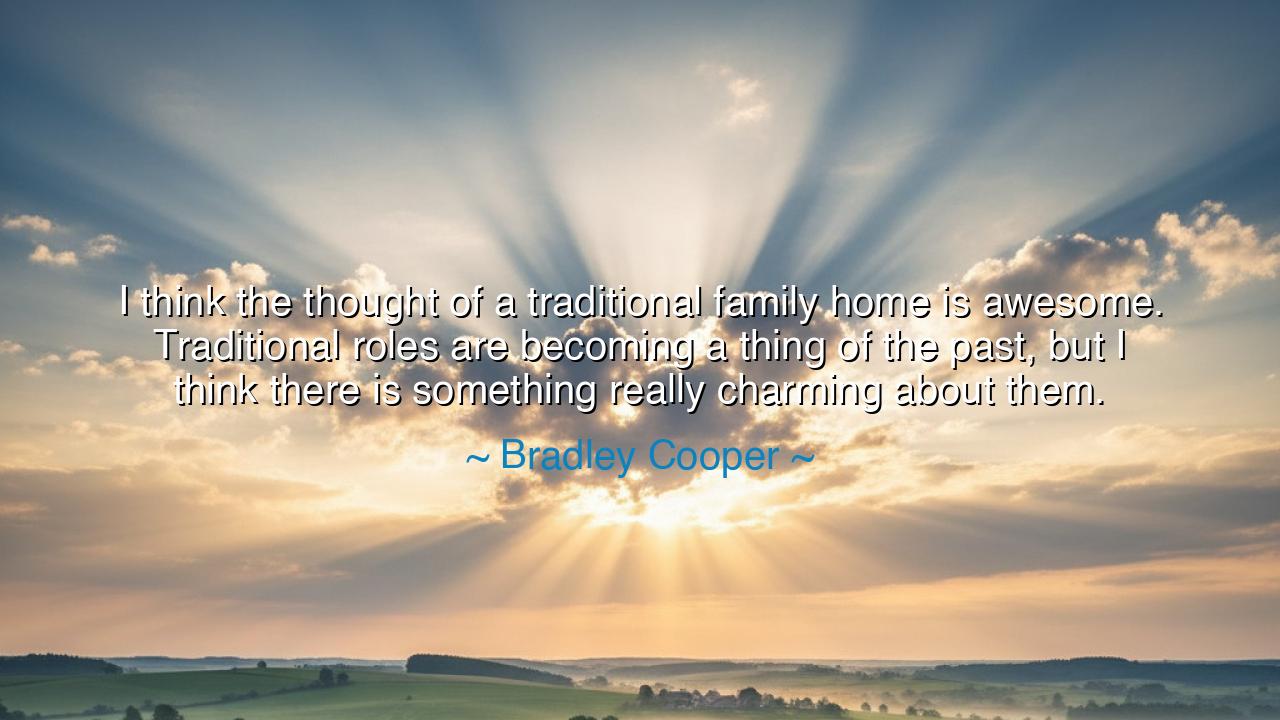
I think the thought of a traditional family home is awesome.
I think the thought of a traditional family home is awesome. Traditional roles are becoming a thing of the past, but I think there is something really charming about them.






When Bradley Cooper said, “I think the thought of a traditional family home is awesome. Traditional roles are becoming a thing of the past, but I think there is something really charming about them,” he spoke not merely of nostalgia, but of balance — the delicate harmony between the old and the new. Beneath his words lies a yearning that has lived in human hearts since the dawn of civilization: the desire for stability, for belonging, for the hearth that anchors the wandering spirit. His statement is not a rejection of progress, but a reverent nod to the beauty of what endures — the quiet strength of home, the warmth of tradition, and the timeless rhythm of human connection.
The origin of this thought lies in the changing landscape of modern life. In an age when roles are being rewritten and social structures redefined, Cooper recognizes the deep human need for roots. He honors the traditional family home not as an ideal of conformity, but as a symbol of love’s architecture — a place where laughter gathers, where stories are shared, where generations meet like rivers converging in a single current. The world may evolve, yet the yearning for the sacred circle of home remains unbroken. For the ancients, this circle was holy — the hearth of the family was tended as a shrine, guarded by flame and faith, symbolizing continuity amidst the storms of life.
To the ancient Greeks, this sacred space was embodied by Hestia, goddess of the hearth and home. Her flame was never allowed to die, for it represented the heart of civilization itself — the point from which all roads led outward, and to which every traveler eventually returned. Cooper’s reflection carries this same spirit. The “charm” he speaks of is not mere sentimentality; it is the recognition of something eternal. Though society changes — though men and women now share roles once divided — the essence of home as a sanctuary of love, respect, and shared purpose remains a cornerstone of human fulfillment.
Yet, there is wisdom in his acknowledgment that traditional roles are “becoming a thing of the past.” The ancients, too, knew that life is constant change — that for something to remain alive, it must adapt. The philosopher Heraclitus taught that the river is never the same, for new waters are always flowing. So it is with the family: its form may shift, its customs may evolve, but its soul — the yearning to build a place of peace and belonging — endures. Cooper’s words remind us that even as we embrace progress, we must not lose the sacred simplicity that once made home a temple, not just a dwelling.
There is an example of this truth in the life of Marcus Aurelius, emperor and philosopher of Rome. Though he commanded armies and ruled an empire, he cherished the moments spent with his wife and children. In his writings, he often spoke of love’s quiet virtues — patience, kindness, and service. For him, the “traditional” bonds of family were not about hierarchy or control, but about mutual devotion and duty. His palace, though filled with the trappings of power, was still centered around the same values that anchor every home: love, responsibility, and care.
What Bradley Cooper finds “charming” is not the rigid past, but the spirit of devotion that traditional life embodied — the father who provided not just bread but wisdom, the mother who nurtured not just the body but the soul, the child who learned honor and compassion beneath their roof. These ideals, stripped of old constraints, remain worthy of reverence. In every age, the challenge is to carry forward the best of what was — to blend the tenderness of tradition with the freedom of modernity, so that love, equality, and purpose may flourish side by side.
The lesson is timeless: in our pursuit of progress, we must not forget the power of simplicity. Technology, wealth, and independence have given us much, but they cannot replace the warmth of a home built on respect and love. Every generation must rediscover for itself what makes the hearth sacred — not the gender of its keepers, but the unity of hearts within it. So, let us build homes, whether of stone or spirit, where every soul feels seen, where love is both anchor and flame.
Thus, Bradley Cooper’s words remind us that while the forms of life evolve, the essence of humanity does not. The world may outgrow old definitions, but it will never outgrow the longing for connection. The home — whatever shape it takes — remains the cradle of civilization and the workshop of the heart. Guard it, cherish it, and fill it with light. For as the ancients taught and Cooper echoes, the truest progress is not to abandon the past, but to bring its charm forward — reimagined, renewed, and alive with love.






AAdministratorAdministrator
Welcome, honored guests. Please leave a comment, we will respond soon